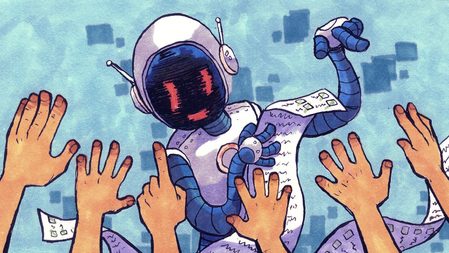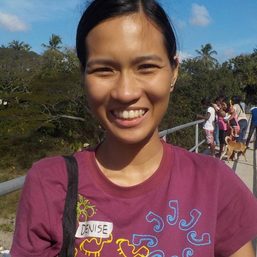SUMMARY
This is AI generated summarization, which may have errors. For context, always refer to the full article.

CAGAYAN DE ORO, Philippines – A Filipino-Swiss scientist is spearheading a groundbreaking research initiative aimed at leveraging Artificial Intelligence (AI) to fight gender discrimination in accessing banking services.
Dr. Adrienne Gorra-Heinrich, the head of Aboitiz Data Innovation’s (ADI) AI Center of Excellence (CoE) in the Philippines, is at the forefront of a team whose research project on mitigating gender disparities within the banking sector has earned recognition in the 2022 Global Top 100 AI Project List.
The list is curated by the International Research Centre on Artificial Intelligence under the auspices of the United Nations Educational, Scientific and Cultural Organization (UNESCO).
Blind data and fairness
The research resulted from a partnership between Union Bank Philippines, Aboitiz Data Innovation, and Queen’s University in Canada. It investigated whether not considering a person’s gender when assessing their creditworthiness had a positive or negative effect on those being protected.
The outcome challenged the notion that keeping the applicant’s gender information from banking services reduced discrimination. Gorra-Heinrich’s team found that this wasn’t the case.
“Blind data does not necessarily result in fairness. In fact, the reverse may happen,” said Gorra-Heinrich, whose Filipino heritage is from her mother, Fe Gorra-Heinrich, originally from Cagayan de Oro City.
The research findings are expected to increase awareness among AI creators about responsible inclusion of sensitive data to prevent discrimination against women and minority groups.
They, however, noted that gender bias in accessing banking services is less pronounced in the Philippines.
“Women here are more powerful, yet an imbalance remains,” Gorra-Heinrich said.
She noted that men still receive preferential treatment over women in accessing financial services like loans.
Gorra-Heinrich and her team’s AI-based efforts to reduce gender discrimination in finance has also been recognized in Canada.
The paper, co-written with three others, received the Best Paper Award at the 2023 Manufacturing Service Operations Management Special Interest Group (MSOM SIG) sponsored by McGill University in Montreal, Canada, in October.
The paper focused on addressing gender discrimination in financial lending decisions through responsible AI.
Another paper by her team, “Removing Demographic Data Can Make AI Discrimination Worse,” was recently published in the Harvard Business Review.
Working on voice tech
Gorra-Heinrich’s team is also working on a project on the use of voice technology, including speech recognition and conversational AI, to streamline banking services.
She said voice technology will remove the need for manual data entry in banking apps, simplifying the process for users.
“It will make interactions with users more natural and efficient,” Gorra-Heinrich said.
She said such a technology will make interactions easier and faster, especially for people who struggle with technology or have physical disabilities like poor eyesight and arthritis.
It would also enhance safety and security by reducing the need for password lists or memorization, Gorra-Heinrich said.
She said. “Your voice becomes your password. This signifies that the typical languages and dialects spoken in the Philippines need to be supported.”
Her team is already working on teaching AI to identify various Filipino accents.
Innovation-hungry
Gorra-Heinrich said she has no regrets about leaving her job at Philips in the Netherlands to work in the Philippines. She said she sees the country as a fertile ground for innovation.
“The Philippines is innovation-hungry,” she said.
Gorra-Heinrich said she also observed that the Philippines is open to taking calculated risks, which is crucial for AI development, in contrast to other countries which are more risk-averse and process-heavy.
She said, “Only with frequent experiments and learning from what we bring to the market can we improve and progress.”
Gorra-Heinrich and her team have raised the profile of the Philippines in the AI world.
“They see that we are doing our work and recognize us for it,” she said.
But she expressed concerns about the lack of Filipino data scientists.
She said only a few educational institutions in the country like the Asian Institute of Management (AIM), University of the Philippines (UP), Ateneo, and De La Salle offer master’s or Ph.D. programs in data science or AI.
Due to this shortage, half of her team are from the Philippines.
The rest are from India, Singapore, and Malaysia.
Recently, Gorra-Heinrich joined AI experts like Nobel laureate and Rappler CEO Maria Ressa, Facebook whistleblower Frances Haugen, and entrepreneur Andrew Keen at the 2023 Social Good Summit, a conference virtually opened by Hillary Clinton. – Rappler.com
Add a comment
How does this make you feel?




![[OPINION] Remembering RSP, Norman and Jessie – geoscientists for the people](https://www.rappler.com/tachyon/2024/04/raymundo-punongbayan-April-29-2024.jpg?resize=257%2C257&crop_strategy=attention)






There are no comments yet. Add your comment to start the conversation.